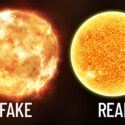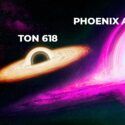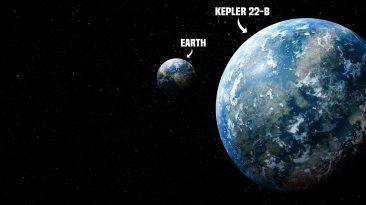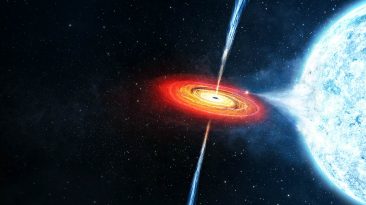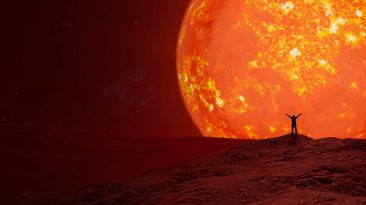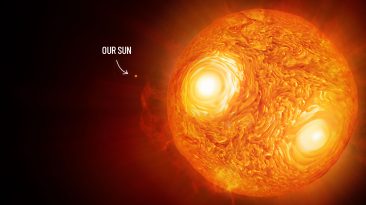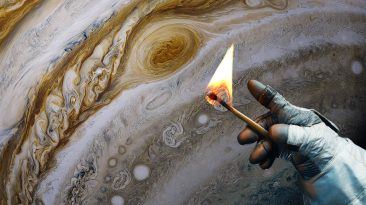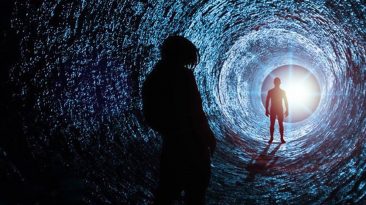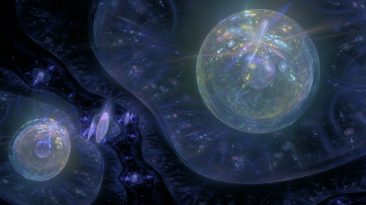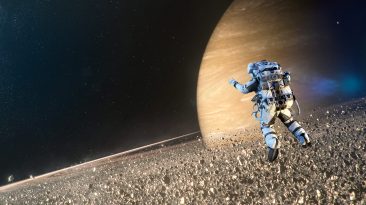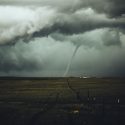Could a black hole devour us all one day? There are millions of them out there just waiting. And if we happened to make a black hole accidentally, well, you better fasten your seatbelts.
Things are going to really suck! Quite literally. What would we see if we got pulled into a black hole? Could Earth orbit the Sun and a black hole? Would we survive spaghettification?
Just 3,000 light-years from Earth is a black hole visible to the naked eye. Thankfully, we are a safe distance from this stellar black hole and many others like it. There are approximately 100 million of them out there in our galaxy that we know of.
They are the remnants of supernovae, which occur when stars 10 to 20 times larger than our Sun collapse in on themselves. Stellar black holes are fairly common and are about 16 km (10 mi) in diameter. And then there’s the much larger competition, supermassive black holes. These have a diameter roughly the size of our solar system and a mass greater than one million suns combined.
One of them, known as Sagittarius A, is right smack dab in the middle of our galaxy. So how close would a black hole need to be a danger to us?
Technically, a black hole the size of a 1mm (.04 in) pin could destroy us if it was close enough to Earth due to its incredibly dense mass and extreme gravitational pull. Our survival all depends on whether we’ve surpassed the event horizon or not.
You can think of this as the black hole’s point of no return. Anything beyond this point would have to travel faster than light to escape. Good luck with that. If Earth got close enough, the side nearest to the black hole would begin stretching toward it.
Our atmosphere would start to be vacuumed up. And then huge chunks of the Earth would rip apart and follow suit. If Earth managed to fall into the orbit of the black hole, we’d experience tidal heating.
The strong uneven gravitational pull on the Earth would continuously deform the planet. This would generate a tremendous amount of internal friction, heating the Earth’s core to disastrous levels.
It would likely give rise to Earth-shattering earthquakes, volcanoes, and deadly tsunamis. The trifecta of doom. Eventually, Earth would begin to stretch in a process known as spaghettification. And not in the tasty cheesy, tomatoey way.
Let’s say you were a superhero and decided to fight the black hole headfirst. Well, your arms would be closer than your feet, causing your body to stretch out vertically and become more and more compressed. Let’s hope your superpower is elasticity.
For an average-sized stellar black hole, spaghettification can occur several hundred kilometers away from the event horizon. But for a supermassive black hole, physicists believe this would happen inside the event horizon due to its size.
Eventually, no matter what size it is, anything entering a black hole would be ripped into a string of individual atoms. This would happen to anything that crosses it. People, planets, stars, you name it.
Unfortunately, our whole solar system would be doomed. The careful balance of the Sun and our many planets would collapse, which could send them crashing into one another. And to add insult to injury, our asteroid belt would get sucked towards us. About 200 of the 552,894 asteroids we know of are more than 100 km (62 mi) across. So if one hit us, we’d be dead before we would turn into spaghetti. Frankly, I’m not sure which fate would be worse.
All of the matter in our solar system would join the accretion disk around the black hole. As matter gets sucked into the black hole, it generates massive amounts of radiation. So, even if we somehow survived all the asteroids, we’d likely die from the radiation.
Believe it or not, astronomers have discovered rare circumbinary planets that orbit two stars. While this may be a possibility with a black hole and our Sun, the extreme tidal forces would most likely make our planet inhabitable.
And worse yet, we might get kicked out of orbit or swallowed by the Sun or the black hole eventually. I’m sorry, but there’s not an outcome where we win here. But, and this is a big but, maybe we could find a way to protect ourselves in some hyper-reinforced space shuttle. If we somehow made it past the event horizon, we might be in for an even stranger time.
Physics as we know it would change. Things like gravity, the speed of light, and even how atoms bind and react might be completely different. The truth is, we don’t know what would happen. We can’t get any information out of a black hole. Would we get pulled into another dimension? End up in a parallel universe?
Sources
- “What To Expect If Earth Ever Falls Into A Black Hole”. Kevin, Pimbblet. 2021. Discover Magazine.
- “Black hole truths, myths and mysteries”. 2016. Curious.
- “New closest-known black hole lies in a visible star system”. earthsky.org.
- “What Exactly Is A Black Hole Event Horizon (And What Happens There)?”. Charles Q. Choi. 2021. space.com.
- “Black hole: What is a black hole? Could a black hole swallow the Sun? What is inside one??”. Fish, Tom. 2019. express.co.uk.
- “Messier 87: Virgo A | Messier Objects“. 2015. Messier Objects.
- “Singularities – Black Holes And Wormholes – The Physics Of The Universe”. 2021. physicsoftheuniverse.com.


